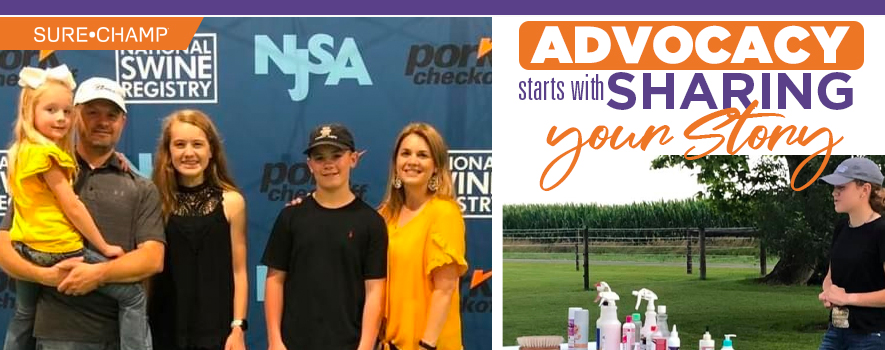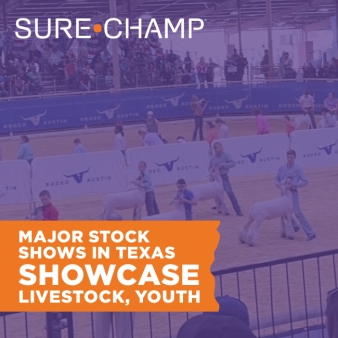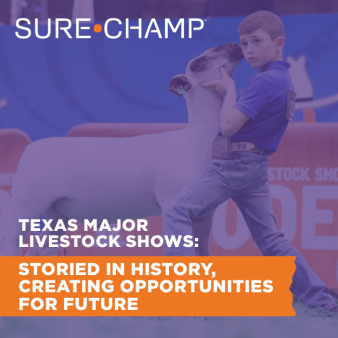
To create advocates in agriculture, we must first be advocates in our industry. Perhaps the best way to create the next generation of spokespeople is to share our story of what we do every day within our own families and operations. Those stories can be shared with peers at school or other organizations or with other groups of people either by the written or spoken word.
Jennifer Shike has been sharing her story while helping build advocates for the agricultural industry for more than two decades. Through a career that started as the director of junior activities for the National Swine Registry, she was able to develop the National Junior Swine Association, leading an organization of young people, many of which are now young parents developing skills within their own children. Most recently, Shike is the editor of Farm Journal’s PORK, where she has the knack for sharing stories about hog producers around the country. However perhaps her greatest strength is developing the three advocates who live in her own household, children Olivia, 15, Hunter, 13 and Harper, 7, along with her husband Dan.
“I think that kids are the best advocates we have for agriculture because they see it in a pure light; they are not bogged down by politics and other people’s beliefs as much. Kids see things for what they are, and I think they are more trusted and more believable to other kids,” Shike said. “There is no more influential time in a person’s life than when they are a child. That’s when they are forming those foundational beliefs and thought processes. It’s easier to influence a young child who has an open mind than it is to influence someone who is older and set in their ways. And there is nobody better to talk to kids than kids.”
The Shike family has engaged in youth livestock projects to teach Olivia, Hunter and Harper the value of agriculture and how to share that agricultural story that has been part of their heritage. Through showing livestock, the kids have learned responsibility, work ethic and taking care of animals that ultimately will become part of the food chain. They have also learned how to share what they do with others, both within and outside of their ag circle.
“Our kids get asked questions all the time from teachers, staff, people in our community and other adults about what the kids do and why they do what they do. They also get asked about issues in the industry. Whether it’s Harper teaching her first-grade teacher the difference between barrows and boars or Olivia talking to her social studies teacher about African swine fever and his wife’s concerns about feeding their kids pork, those are some pretty powerful positions that they find themselves in simply because they show pigs. When I think about that, I get a little choked up. That’s a big responsibility. How do I equip them to answer those questions? It’s a unique opportunity and I think it’s so important to provide them with the right information to have those conversations,” Shike said.
Resources and Mentors
Although all kids mature at different rates and build their confidence at different times, Shike believes if a youth is able to hold a pig whip and drive a pig in to the show ring, he or she should be able to answer some basic questions about its care. Educating the young people who show livestock should start at home with the parents, and even with the parents having varying experience levels, there are many advisers available to them.
“There are a ton of mentors and resources out there. Get involved and engaged in organizations like the National Junior Swine Association, Team Purebred, 4-H and FFA. There are a plethora of ways kids can learn and be exposed to important information,” she said.
Once parents are armed with the knowledge they need, they can better prepare the next generation of young advocates, according to Shike. There are many ways for young people to gain information from reading industry magazines, searching the internet and talking to peers; however, the parents need to be the funnel for that information and make sure that the information is accurate and appropriate for the age level of the kid. They also need to make sure that their children are relaying the messages accurately.
“As a parent, it starts with you,” she said. “Remember, these are not pets; they are animals that will be entering the food chain. It is up to the parent to guide the kids and pave the way.”
Shike encourages her kids to manage their time wisely and to invest their resources in ways so that they can grow their knowledge base about the swine industry or any other topic of interest at the time in a way that will benefit another area. For example, Olivia was enrolled in the Vet Science 4-H project and focused a project on African swine fever so she could gain valuable information that would benefit her as a swine exhibitor and spokesperson for the industry, something that came in useful when talking to her social studies teacher. Both Olivia and Hunter have written papers and presented speeches at school that tie into their agricultural passions.
Becoming Mentors
In addition to sharing their ag stories, it is important for the Shikes to serve as mentors to those who are interested in getting involved in livestock projects – not only in their local community, but everywhere they show. For the second year, they have hosted a swine clinic at their home to demonstrate proper showmanship, feeding and fitting techniques. Olivia and Hunter also talk about some basic key issues relevant to the industry in terms that their peers can understand.
It is also imperative that the Shike kids set a good example at shows, at the local, state and national levels. This includes encouraging involvement in contests and cheering on friends before and after they show.
“You always think of your kids looking up to other kids, but you don’t think of other kids looking up to your kids. Last year at the National Junior Show, someone told me her kids looked up to my kids and that stopped me in my tracks,” Shike said. “People are watching what I do –people are watching my kids, too. My kids are being role models by the practices they implement when working with their pigs.”
Sharing your story can start with the simple task of explaining the difference between a barrow and a boar. And with experience, those stories evolve. It’s important to share your agriculture story to keep the history and heritage alive and to keep the production practices of a safe, wholesome product on top of consumers’ minds. It starts with one conversation. It starts with you.
“When you’re passionate and you truly love something, it just comes out of you. My advice to young people about sharing their ag story is to make sure you love it. If you simply love it and care about it, you’re going to do the extra work, go to the extra meeting, do the extra research or take the extra steps to get it done well. I believe that passion fuels success. The kids that impress me most simply have that passion in their veins and that attracts people and brings them in,” Shike said.
Share your passion. Share your story. Talk to your peers and talk to their parents. Make sure that our industry is around for even the next generation to talk about.

